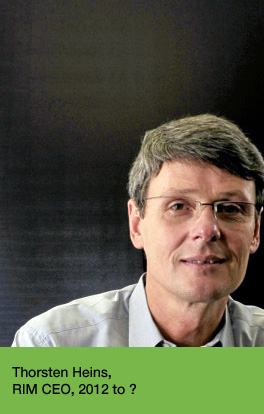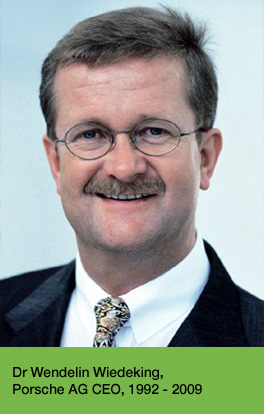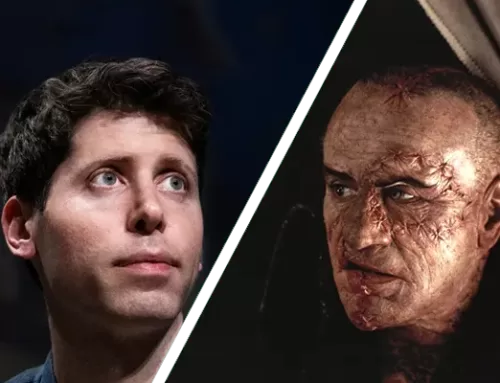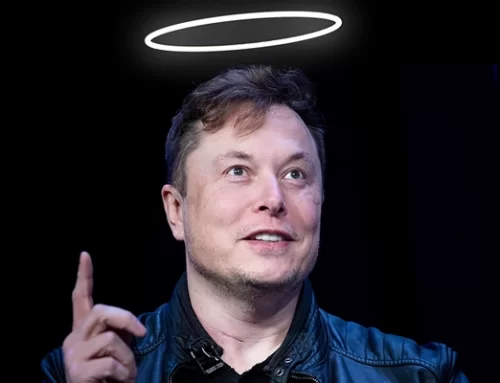
First of all, some perspective. We should acknowledge that very successful companies often experience very difficult times in their history. Porsche, despite its decades of success and current position as the most profitable car company in the world, was in dire straits in 1992, when Wendelin Wiedeking became CEO. Apple, lest we forget, was 90 days away from bankruptcy [1] when it re-hired its founder, Steve Jobs, in 1997. I doubt I need to remind anyone that Apple is currently flirting with having the highest market value of any company on the planet.

Comparing RIM to Apple isn’t exactly Apple-to-Apple, or even relevant, except in one key area: smart phones. Apple has evolved from being a computer company to a technology/entertainment/publishing/smart phone conglomerate. The majority of revenue and profit no longer comes from computers, and hasn’t for a while. In many ways, RIM is still the smart phone company it was in 2001, with a tablet introduced for what appear to be misguided and reactive competitive reasons, rather than brand-building reasons.
I would argue that Apple’s success now comes not so much from its technology as its brand power. All in, and for market segments that matter most, iPhone isn’t beating Blackberry on engineering technology, it’s winning on vastly superior holistic branding.
RIM’s problems aren’t a matter of intelligence. RIM had plenty of that in Mike Lazaridis and Jim Balsillie, and they have plenty of intelligence still within the confines of their Waterloo-based campus. There’s no reason (yet) to believe RIM’s new CEO, Thorston Heins, isn’t as brilliant his predecessors. What RIM needs is the right leadership for the present & future, something they had at an earlier stage of development in the former co-chairmen.
What I mean by the right leadership for the time is better illustrated by the Porsche example than the Apple example. There are some interesting parallels between Dr Wiedeking and Mr Heins in this context:
- both men were/are relatively unknown to the outside world when they take over in difficult times,
- both were/are 41-year-old [2] Germans at takeover time and
- both are engineers by education and seminal career.
Starting in 1992, Wiedeking led Porsche to:
- focus re-engineering efforts on significantly improving the iconic Porsche model, the 911
- drop all other model lines, which were faltering anyway
- focus on the geographic market that provided the greatest potential for the next 5-10 years: the United States (there was no China market as we know it today)
- in the key geographic market, position the Porsche brand as being human, joyful and appealing to all of the senses, without denying its racing heritage and engineering excellence. For the first time, Porsche engineers paid attention to how their sports cars sounded and how the interiors smelled and were appointed.
Usually, company focus follows the expertise of its leader. Did I mention Herr Wiedeking is an engineer, not a marketer? Yes, well, somehow he managed to lead as a marketer, which was what the brand needed most at the time. This is what the right leader does, whether the company needs a focus on marketing, finance, operations or whatever. After re-building the brand from a stronger core model, Porsche went on to carefully introduce other models lines with more success and longevity than ever before in its history. [3]
I will admit this post is overly simplistic. It’s really just a starting point. But it’s far better that the tweet version would have been, which goes all the way to glib in its 140 characters:
RIM must find leadership right for the times to build the brand beyond its technology. Like Dr Wiedeking & differently, Mr Jobs.#mktgwildrns
- This was a comment later made by Steve Jobs. The record shows that in 1997, Apple had lost $1.86 billion in the previous two years.
- Okay, Wieideking was 41 and looked 41. Heins is actually 54 but looks 41, or even younger. I hate it when the facts get in the way of a good argument.
- Despite (arguably) being the second-most-important leader in Porsche’s history, Wiedeking was ousted from the company in 2009. That story requires more than a tweet to explain as well.




